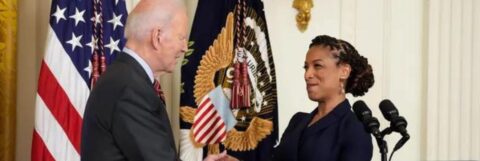Detroit Free Press
April 8, 2023
Carol Cain
There are dreams we all have that seem to fade away the moment we awake. Occasionally, a few dreams linger.
For Detroit entrepreneur Natalie King, it was a dream in 2018 where she heard a voice as she awoke telling her to start a company making EV charging stations that caused her to jump to action and do just that.
King officially launched Dunamis Charge in early 2020 and has been on a whirlwind journey that took her to the White House on March 27, where she was invited to introduce President Joe Biden at a SBA Women’s small business event.
King, a person of faith, told me she knew that voice was divine intervention, which is why she wasted no time in following up. She had started Dunamis Clean Energy a few years earlier in 2012, which does energy audits for companies, so she knew about technology and the evolution taking place.
Related: Mobility Tech Stars: A Rising Star in a New Frontier
But she wasn’t sure what she needed to do to start an EV charging company. She worked hard and she learned. She is believed to be the only Black woman with a company manufacturing EV charging stations in America.
“Thank you for doing such an amazing thing — making chargers for electric vehicles in Detroit,” Biden said of King at that event after she introduced him. “Thanks to folks like Natalie, in cities and towns all across America, we’re seeing pride coming back. You’re bringing back businesses all across America, not just in the East and the West Coasts.”
The vision has come together as King hoped, making EV chargers in her hometown to provide Detroiters with good jobs. She’s doing so inside a plant she is leasing on East Grand Boulevard, not far from the old Packard plant. She is making commercial electric vehicle chargers right now, albeit slowly. Each charger must go through intense testing, verification and accreditation.
She has 20 employees now, which will grow to 50 by the end of 2023. Her goal is to eventually make 400,000 chargers a year on four assembly lines, a process for which it will take a few years to gear up. So far, she’s made a couple hundred.
King is a Tier 1 supplier to DTE Energy and is working with other companies, as well. She has some interesting projects coming up, including one she was not at liberty to reveal other than to say it would help more Detroiters charge their EVs around the Motor City.
“Natalie and the team at Dunamis are a success story that provides a powerful example of Detroiters seizing the opportunity that electrification offers to Michigan’s evolving mobility industry,” said Glenn Stevens Jr., CEO of MICHauto and vice president of automotive and mobility initiatives at the Detroit Regional Chamber. “They are also demonstrating how the intersection of new energy and automotive industries truly does offer opportunity and inclusion in this expanding sector of our economy.”
I wondered how King ended up sharing the stage with Biden.
“I’d been involved with the SBA as I obtained loans from them. I met SBA Administrator Isabella Casillas Guzman at a Women’s History Month event at Lawrence Tech, with Congresswoman Brenda Lawrence, last year,” she said.
SBA officials were intrigued when they heard about her fledgling company.
“They (SBA folks) wanted to see my plan as we hadn’t launched production yet,” she said. “They were really excited by what we were planning to do in the community, and we kept in touch via email.”
King was invited to testify in March 2022 at a congressional subcommittee on EV chargers.
Still, she was “shocked” when she got an email from the SBA on a Thursday — just four days before the March 27 event, asking if she wanted to participate in the SBA’s second annual women’s business conference and panel, and introduce the president.
“I couldn’t believe it!” King said.
‘Blessed’
Knowing there are tremendous opportunities in the EV space for minority-owned firms and that sometimes they slip by because bigger firms don’t know they are out there, King got together with some other high-profile entrepreneurs — Carla Walker-Miller of Walker-Miller Energy Services, Kameale Terry of ChargerHelp!, Kwabena “Q” Johnson of PlugZen and William McCoy of Vehya — to address the void and launch BEVI (Blacks in Electric Vehicle Infrastructure).
The organization was unveiled at the Detroit auto show at Huntington Place in September. Its mission: align Black-owned and -operated companies specializing in the manufacturing, installation, maintenance, repair, diagnostics, resell and distribution of Electric Vehicle Supply Equipment (EVSE). With exponential growth projected, the opportunities are endless.
“There’s going to be trillions of dollars committed to EV infrastructure,” she said. “We are in an industrial revolution. We want to make sure Black and brown companies are not left behind in that.”
BEVI has grown to 10 members, with more companies and organizations looking to join, King said.
When asked what her 10-year plan for her company was, King said, “I see it as a provider of chargers across the globe. And I’d also like to take the company public.”
As she looks back at that White House experience and thinks back to that voice that set her on her journey, I asked how she felt about it.
“I feel blessed!” she said.

